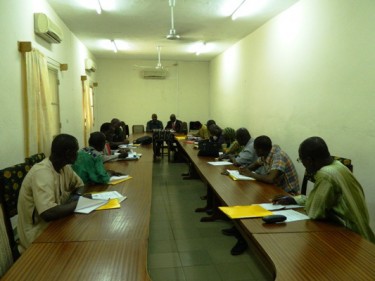A recent row between a veiled woman‘s husband and the police in Trappes, a low-income suburb of Paris, was followed by numerous erroneous posts and images [fr] posted on social media websites. The blog Les Décodeurs, which strives to sift out truth from lies on the Francophone web, was quick to counter the false information.
Fabrice Florin, the French-speaking founder of NewsTrust and TruthSquad, explains the need for fact-checking initiatives:
There is a growing amount of misinformation, particularly in this political climate [..] With an expanding universe of news options, once someone finds a source of information they like or agree with, they tend to cling to it. The reason [for fact check] is to get people thinking about what they read and hear, and from there, questioning it.
Here is a review of recent events that were reviewed extensively by fact checkers in French-speaking online media.
Row in Trappes
On July 19, 2013 in Trappes, the husband of a Caribbean woman who was wearing a niqab (face veil), allegedly tried to strangle [fr] a police officer. Following the husband's arrest, 200 people protested in front of a police station destroying property, and were eventually repelled by riot police. Images posted on social media were erroneously tagged as originating from the violence during the protests. Les Décodeurs unpacked numerous errors [fr]:
Quelques personnes, en général connues pour leur activité militante, diffusent sciemment de fausses informations. C'est le cas de cette photo, diffusée par Stéphane Journot, ancien militant UMP, actif durant la campagne de 2012
Some people, known for their political activism, knowingly share false information. As is the case with this photo, shared by Stéphane Journot, a former UMP (right wing party) activist from the 2012 campaign.
Below is the erroneous tweet and photo [fr]:
Après on va crier au racisme mais… regardez… #Trappes pic.twitter.com/1vwch14eK6
— Stéphane Journot (@sjournot) July 22, 2013
you might call this racism but..look for yourself #Trappes
The photo was in fact an old image taken in 2010 in Lyon. Les Décodeurs adds that there were many similar tweets spreading, knowingly or not, the wrong information.
Fact checking on the African continent
African nations are well aware of the importance of fact-checking initiatives. Ushahidi, the world's first crowd-mapping platform originated from the African continent. A project called Africa Check specifically monitors information from African leaders. Their mission statement says:
We test claims made by public figures around the continent, starting in South Africa, using journalistic skills and evidence drawn from the latest online tools, readers, public sources and experts, sorting out fact from fiction.
In Francophone Africa, the focus has been mostly on election monitoring. Election monitoring initiatives, in Senegal, Burundi, are well-established. Elections are coming up in a few Francophone nations,including Mali, Togo and Madagascar. Pen Plus Bytes has dedicated a specific platform for election monitoring in Africa called the African Elections Project (AEP). The project wrote the following report on the ongoing Togolese parliamentary elections:
About 3.3 million registered Togolese voters will cast ballots today in 7,600 polling stations to select 91 Parliamentarians out of about 1,174 contesting candidates from the ruling and opposition parties. This election has been delayed for eight months amid concerns by opposition parties that the poll won’t be transparent and fair.
Sylvio Combey in Togo has already posted images of alleged fraud from his Twitter account:
8h l'urne vient d'être montrée vide aux votants à #Kanyikopé #TGInfo #TG2013 #Nukpola #Fb pic.twitter.com/DZU1iFTPqI
— Sylvio Combey (@SylvioCombey) July 25, 2013
8:00, A ballot box is shown to be empty in #Kanyikopé (Togo) #TGinfo #TG2013 #Nukpola #Fb
In Mali, Rising Voices (a Global Voices project) grantee Fasokan has been involved with the monitoring the upcoming Presidential elections. He wrote about the training of electoral observers [fr] :
Pendant cinq jours, plusieurs thèmes ont été abordés : la loi électorale, la charte des partis politiques, les genres journalistiques (compte rendu, portrait, interview…), les règles de déontologie et éthique du journaliste, les contraintes liées à l’exercice de la profession
For five days, several topics were discussed: the electoral law, the charter for political parties, the different journalistic activities (report, biography, interviews …), the rules of conduct and ethics of a journalist, the constraints while conducting journalistic activities
Madagascar also awaits elections and concerns are already arising with false information posted on the web. During recent protests asking for a firm electoral calendar, a photo claiming that protesters were out in force was fact checked by Global Voices contributor Jentilisa.
Jentilisa wrote [mg]:
Fa maninona ho'aho ity sarin'ny tolon'ny 2009 na fony mbola tsy vita ny lapan'ny tanàna hita amin'ny “grue” manakaiky ny hazo avo ireo no miverimberina hanetanana ny tolonareo e? Sahala amin'ny hoe io no tao androany nefa tamin'ny 2009 ity sary ity?
Why is a photo from 2009 resurfacing again (and tagged as photo from recent events)? One can see with the crane in the background that it is clearly not a recent photo. This crane was there in 2009, wasn't it ?
The photo Jentilisa disputes is below:
With the worldwide growth of the web, it is critical that fact checking project becomes more mainstream and better known as well.








